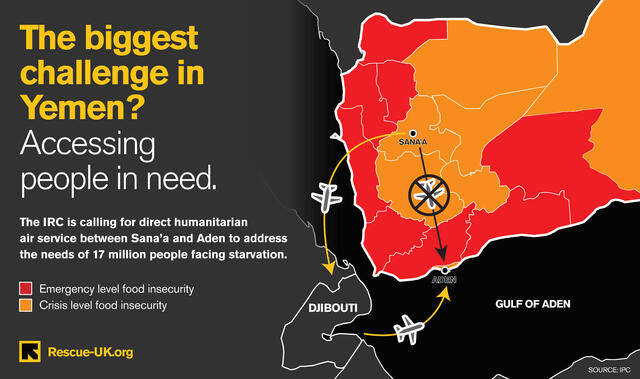Yemen is facing the largest humanitarian crisis of our time: two-thirds of the population are at risk of starvation – and in dire need of support. Support, that’s hard to give to them. We have an opportunity to unblock these barriers and get aid to people in need. Here’s what we need to do.
Two years of civil war in Yemen has brought the country to the brink of famine. Fighting has crippled the agricultural sector, driven unemployment, impeded imports and sent food and fuel prices soaring. To makes things worse, ongoing conflict means it is extremely difficult to deliver the aid people need.

Yemen imports around 90% of staple foods yet warring groups are deliberately blocking vital supply routes. The main port of Hodeida, for instance, is at risk of attack - an attack that would prevent support reaching people in need.
A logistical nightmare
There is rampant hunger in the south of the country, so getting food, lifesaving medicines, water trucks and other urgent supplies from the capital, Sana’a, to Aden on the south coast is a logistical nightmare. In times of peace, a direct flight was only 45 minutes and the drive would take around eight hours. But violent clashes between government and rebel groups has halted all flights between the two cities and rendered the land route unsafe. Even for vehicles that do arrive safely, the journey takes several days due to permit delays, so the goods often arrive too late to save lives.
In order to reach Aden from Sana’a, aid workers are required to:
- apply for a visa upon arrival in Yemen
- fly out of the country to neighboring Djibouti
- then travel back to Yemen and on to Aden.
It’s a time-wasting, long-winded journey that can take days and keep vital assistance away from those that need help.
Change is possible.
Change that will help us to get support to the people that need it most. Until earlier this month, Aden airport did not have a humanitarian air service at all so aid workers had to take a 16-hour boat ride across the Red Sea from Djibouti.
Having strongly advocated for improved access, we welcome the news that humanitarian flights have resumed into Aden from Djibouti. But we need to go further: only a direct humanitarian air service from Sana’a will make a big difference to famine-relief efforts.
At a time when solutions feel scarce, opening up the Sana’a to Aden air route is a specific and feasible solution that has the potential to save millions of lives in the south of Yemen.
What is the IRC doing to help?
The IRC reclassified the crisis in Yemen to its highest alert levels and is scaling up work to respond to nutrition and health needs in affected areas, as well as distributing cash vouchers for people to buy food.
Ultimately, only a ceasefire will allow organisations like the IRC to deliver aid safely to everyone in Yemen who needs it. That’s why we are urgently calling on all parties to the conflict to support a cessation of hostilities.